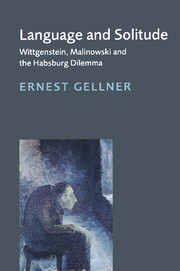Crossref Citations
This Book has been
cited by the following publications. This list is generated based on data provided by Crossref.
Fritz, Gayle J.
1999.
A Taste of Ethnobotany for EveryonePlants, People, and Culture: The Science of Ethnobotany. By Michael J. Balick and Paul Alan Cox. New York: Scientific American Library, 1996. 208 pp..
Current Anthropology,
Vol. 40,
Issue. 3,
p.
402.
Dike, Azuka A.
1999.
Rural Norms and Urban Life in LusakaKeeping House in Lusaka. By Karen Tranberg Hansen. New York: Columbia University Press, 1997. 228 pp..
Current Anthropology,
Vol. 40,
Issue. 3,
p.
406.
1999.
Books Received.
Current Anthropology,
Vol. 40,
Issue. 3,
p.
409.
Conversi, Daniele
1999.
Ernest Gellner as Critic of Social Thought: Nationalism, Closed Systems and the Central European Tradition.
Nations and Nationalism,
Vol. 5,
Issue. 4,
p.
565.
Slipp, Samuel
1999.
Commentary: From Divergence to Convergence in American Psychoanalysis: The Influence of Freud's Background on the Splitting of the Psychoanalytic Movement.
Journal of the American Academy of Psychoanalysis,
Vol. 27,
Issue. 3,
p.
503.
Appell, G. N.
1999.
Losing One's Head in Southeast AsiaHeadhunting and the Social Imagination in Southeast Asia. Edited by Janet Hoskins. Stanford: Stanford University Press, 1996. 296 pp..
Current Anthropology,
Vol. 40,
Issue. 3,
p.
407.
Friedl, Ernestine
1999.
Historical Ethnography at Its BestFields of Wheat, Hills of Blood: Passages to Nationhood in Greek Macedonia. By Anastasia N. Karakasidou. Chicago: University of Chicago Press, 1997. 334 pp..
Current Anthropology,
Vol. 40,
Issue. 3,
p.
401.
Howell, Nancy
1999.
The Demographic Puzzle of the Philippine AgtaPopulation Dynamics of a Philippine Rain Forest People: The San Ildefonso Agta. By John D. Early and Thomas N. Headland. Gainesville: University Press of Florida, 1998. 208 pp..
Current Anthropology,
Vol. 40,
Issue. 3,
p.
405.
Reed, Michael C.
1999.
Follow the Money toRealScienceConsilience: The Unity of Knowledge. By Edward O. Wilson. New York: Alfred A. Knopf, 1998. 332 pp..
Current Anthropology,
Vol. 40,
Issue. 3,
p.
403.
Taylor, James R.
2000.
Is There a “Canadian” Approach to the Study of Organizational Communication?.
Canadian Journal of Communication,
Vol. 25,
Issue. 1,
Therborn, Göran
2000.
At the birth of second century sociology: times of reflexivity, spaces of identity, and nodes of knowledge.
The British Journal of Sociology,
Vol. 51,
Issue. 1,
p.
37.
Gaille-Nikodimov, Marie
2000.
État et sciences sociales.
Revue de Synthèse,
Vol. 121,
Issue. 3-4,
p.
479.
Allardt, Erik
2000.
Edward Westermarch: A Sociologist Relating Nature and Culture.
Acta Sociologica,
Vol. 43,
Issue. 4,
p.
299.
Batteau, Allen W.
2000.
Negations and Ambiguities in the Cultures of Organization.
American Anthropologist,
Vol. 102,
Issue. 4,
p.
726.
Rapport, Nigel
2001.
The Randomness and Relatedness of Every Person: A Reply.
The Australian Journal of Anthropology,
Vol. 12,
Issue. 2,
p.
220.
Hann, Chris
2001.
Gellner's Structural-Functional-Culturalism.
Czech Sociological Review,
Vol. 37,
Issue. 2,
p.
173.
Engelberg, Edward
2001.
Solitude and Its Ambiguities in Modernist Fiction.
p.
7.
Taylor, James R.
2001.
The 2001 Southam Lecture: Reflections on Harold Innis's "Minerva's Owl".
Canadian Journal of Communication,
Vol. 26,
Issue. 3,
p.
327.
Musil, Jiří
2001.
Gellner's Philosophy of History - Interpretations and Problems.
Czech Sociological Review,
Vol. 37,
Issue. 2,
p.
153.
Pihlström, Sami
2001.
Death—mine or the other's? On the possibility of philosophical thanatology.
Mortality,
Vol. 6,
Issue. 3,
p.
265.





